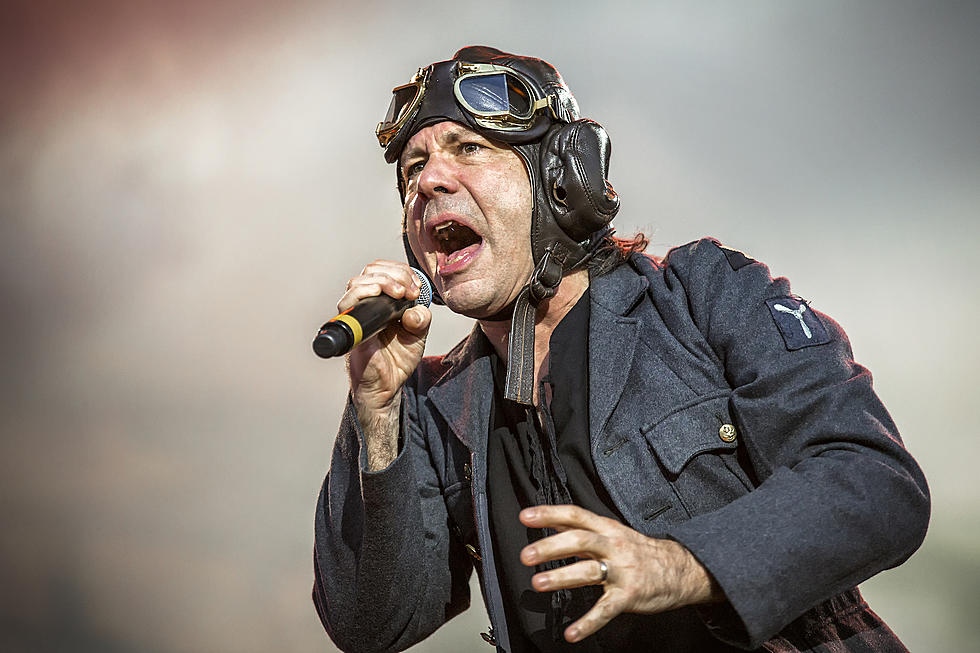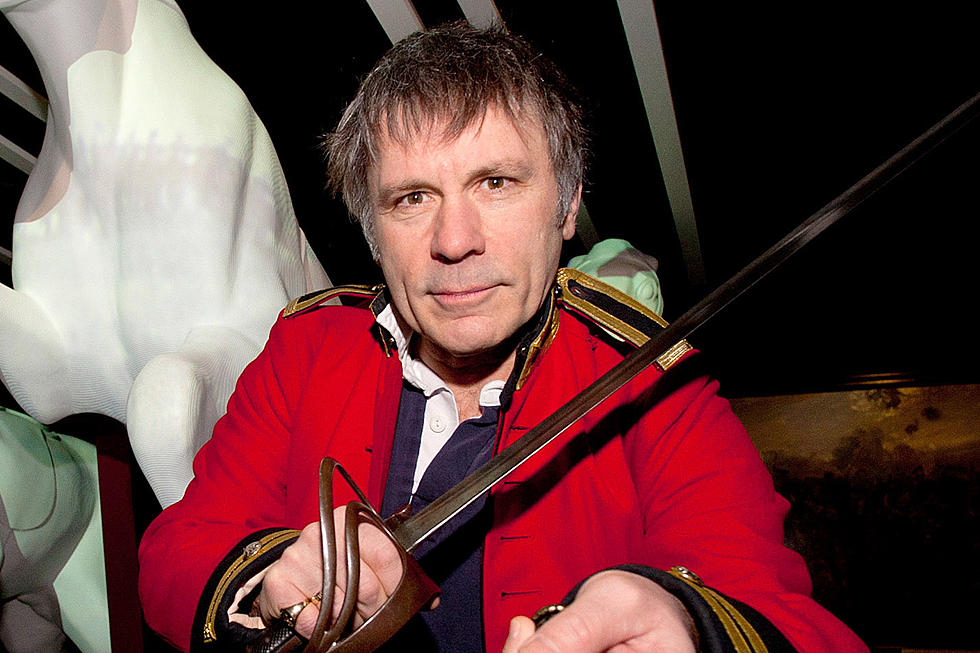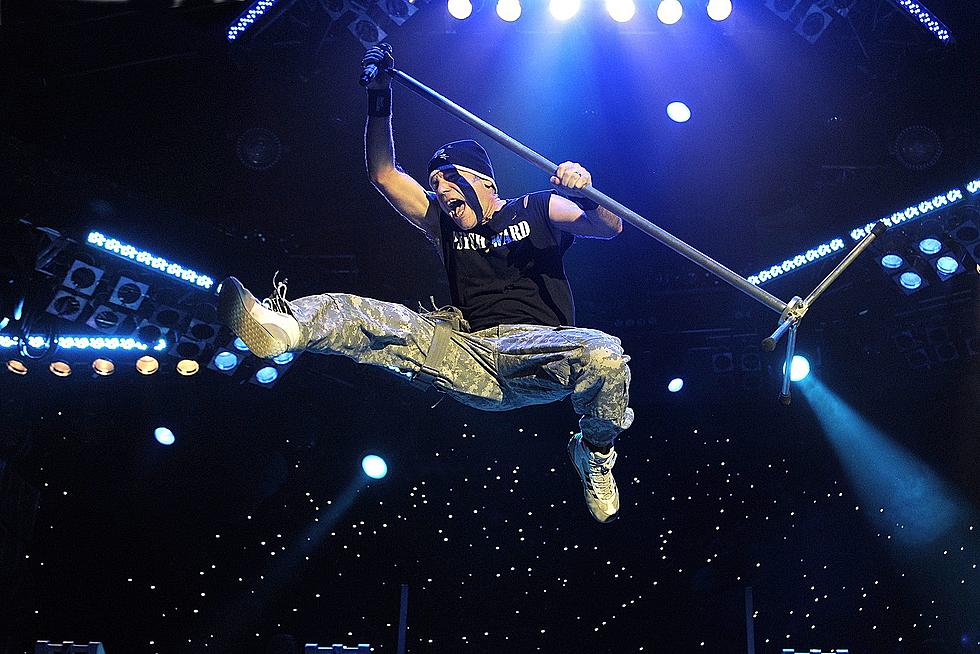
Bruce Dickinson Says Pandemic Helped Individuals Realize Greater Sense of Self-Worth
Iron Maiden's Bruce Dickinson was the latest guest on Full Metal Jackie's weekend radio program. He's in the midst of a lengthy spoken word tour in which, for nearly three hours a night, he shares personal experiences from throughout his life and musical career while also fielding questions from the audience.
While the feeling of being back onstage at all is exhilarating, Dickinson actually found the lockdown period to be a bit enjoyable as he was able to occupy his day with ordinary things he simply did not have time for in the past, such as binge watching Sons of Anarchy on Netflix.
Elsewhere, he talked about getting to work on a new solo album, having a hip replacement, and how the pandemic helped individuals realize their sense of self-worth in regards to financial compensation for work.
Read the full interview below.
You're well accustomed to playing enormous venues in front of tens of thousands of people. What's different and maybe more challenging about connecting with a more intimate spoken word audience?
You've got anywhere between 800 to 1,400 people in a small theater, so you're right on top of everybody. There's no autocue and there's no safety net. There's no teleprompter — it’s all on you, basically. The show takes off and it's an hour-and-a-half of the story of a spotty kid from a town that nobody has ever heard of and nobody ever will, again, ends up wearing the world's most ridiculous trousers and fronting a well-known folk rock combo.
Have you had any Spinal Tap moments on your spoken word tours? It must be different whereas when you're on a stage and one of the production elements doesn't happen, you have a whole band of people behind you if it's an Iron Maiden show. But when you're on your own, if the projector doesn't work... has something happened to you yet?
No, not really. I dealt with that very easily. There's two things about the show, which means that nothing can go wrong.
One is that we don't have a drummer and the other thing is that there is no production. We have an HD screen and a really good HD projector and there's 12 pictures that get shown through the show — no words. You don't have to be able to read and write to come to the show.
We do an hour-and-a-half and then there's a 25-minute interval and during the interval, I actually use the screen because a lot of the theaters we play have great sound systems now. I actually brought "The Writing on the Wall" video as it should be seen like in a movie theater. We've got that with a Dolby sound system with Dolby soundtrack with special effects.
Then the second part of the show, I come back out and the audience writes questions, statements, etc. on cue cards, and I rearrange them into a kind of improv script. That depends on how good the questions they come up with are. The whole thing is a little bit under three hours.
Iron Maiden, "The Writing on the Wall" Music Video
Spoken word and singing are two different things. But, fundamentally, both are about communicating. What aspects of your spoken word skills might come to indirectly affect your craft as a singer?
The only one really is chatting with the audience and telling stories in between songs, which, one of these days, I might get back to.
I'm actually going to be doing some writing with Roy Z. to try and finally — after 14 years — to do a follow up to Tyranny of Souls and The Chemical Wedding with a solo album. Then I go back to Europe and it's straight into rehearsals with the Maiden boys. We really don't stop until the beginning of November. You never know how long it might go on for — we've got [two] years of catching up to do, as does everybody in the whole world. [Two] years of their lives that have been stolen by this dreadful virus and all the things associated with it, so it's about time we all got out of our bunkers and our silos and just go see a live show, whether it's spoken word or music or whatever.
I've been improving on my cooking skills the last three years and it has not been good. I'm okay. I can now cook scrambled eggs and I can open a tin of beans.
You are a renaissance man — multifaceted and pursuing numerous endeavors seemingly all at once. What has the pandemic taught you about the value in something standing still?
Numerous endeavors seemingly all at once is the crucial bit. I was in Paris when the lockdown [was imposed] there. I had just come back from doing a couple of spoken word shows at another place that's sadly in the news at the moment — Moscow and St. Petersburg [in Russia]. That was three years ago and was very bizarre doing spoken word with simultaneous translation.
I got back to Paris and I said to my partner, "We should get a printer." We had no printer and then that evening, as we just installed the printer, the President of France [imposed the lockdown at midnight]. We had to have a piece of paper that would allow us to go outside. Every single day we needed a new piece of paper with our name, address, date of birth and why we were going outside. We were out for one hour a day and that was that was two months.
Strangely enough, I really enjoyed it because the sun was shining, I sat on the balcony, made breakfast, did the workouts in the room. We're on the sixth floor, so I didn't bother using the lift and I'd run downstairs.
Netflix — I never bothered watching it before because I was always too busy. Suddenly, we got into binge watching Sons of Anarchy. When I started the storyboard for the Maiden music video... four biker Eddies of the apocalypse — [Sons of Anarchy is] where that came from.
Lots of good stuff happened, but all at a much lower tempo than normal. Even though my life is getting really busy now, I still look back at that period and go, "You know what? It's actually fine to just stare out the window for a while and chill out."
A lot of people have reassessed how much running around was actually beneficial to them, psychologically, and how much they were running around doing things for the benefit of other people only and having no benefit to themselves. There's so many jobs out there at the moment paying hardly any money and they can't get people [to fill those openings]. People are going, "I'm actually worth something."
That's the most positive thing that's come out of it — human beings are worth something. Nobody wants to do a rubbish job for no money. Pay me money and I'll go take the trash out, but have some respect.
Your music is indispensable to so many fans around the world. What do you consider about those people when you contemplate the ultimate lifespan of your musical career?
I hope we haven't gotten to the end of the lifespan of our musical career. We were not planning to retire at all, really. I think we're probably dropped dead onstage. We're all still firing away with loads of energy and loads of enthusiasm, so I can't wait to get back together.
We've got generations of fans. Even on the spoken word shows I can crack jokes about the age of the audience only because half the audience is like my age, but the other half of the audience is often way, way younger. It's brilliant. We've got this whole intergenerational thing going and, with the Maiden shows, it's even bigger. There's huge numbers of women and it's fantastic because it always used to be the cliché in the early '80s that heavy metal was misogynist, male-dominated stuff. There's loads and loads of heavy metal fans who are girls and other pronouns.
Iron Maiden, "Flight of Icarus" (Live from The Legacy of the Beast Tour)
There's two parts of the spoken word show as to what fans can expect. But what do you want to leave people with when they're walking out of these shows?
The main one is, "That cheered me up. That was funny. I learned a little bit of something, but not a lecture and that was worth three hours of my life. I feel better for it."
I've got a best-selling shirt and it's on the back of it, it says, "Life is better than all the other options," and it's something I came up with after I got done with cancer. I said it to the show and it got a big cheer. Basically, that's me in a nutshell and that's what the show is in a nutshell. It's undiluted enthusiasm and not taking yourself terribly serious.
Before we go, I did want to just check in on how you're feeling these days.
Great! The cancer thing is all good. I snapped my Achilles tendon four months before the tour, but nobody figured that out. I had to tell people so they knew I suffered and then in lockdown, I went for a checkup and the guy said, "You've got a big chunk of osteoarthritis, which is wear and tear basically, in one of the hips. I said, "Well, IndyCar divers go in and they change their tires, so let's go in and swap it out. Let's get a new one."
So, I did. I've got five inches of titanium hammered into my leg by a psychopath and it works great.
Do you set off metal detectors now?
Occasionally, but sometimes it's not that sensitive. I'm actually really excited when I set off a metal detector, but loads of people have got these. Tennis players are having double hip operations in their 30s. Andy Murray is playing with two metal hips on the ATP tour. I've got no excuse for not running around. I'm competing in fencing and doing all this stuff... When we were doing the rehab on the hip during lockdown, the hospital had a gym — the others were all closed — but because it was medical, I could go.
We set up like this little jungle gym. The physiologist said, "Once we get done with the first three months, we'll just have you leaping on and off boxes, taking running jumps and things and basically doing what you do on stage in the gym," which is super cool.
Thanks to Bruce Dickinson for the interview. See a list of all upcoming Bruce Dickinson spoken word tour dates at this location and find out where you can hear Full Metal Jackie's weekend radio show here. Follow Iron Maiden on Facebook, Instagram, Twitter and Spotify and get their latest album, 'Senjutsu,' here.






